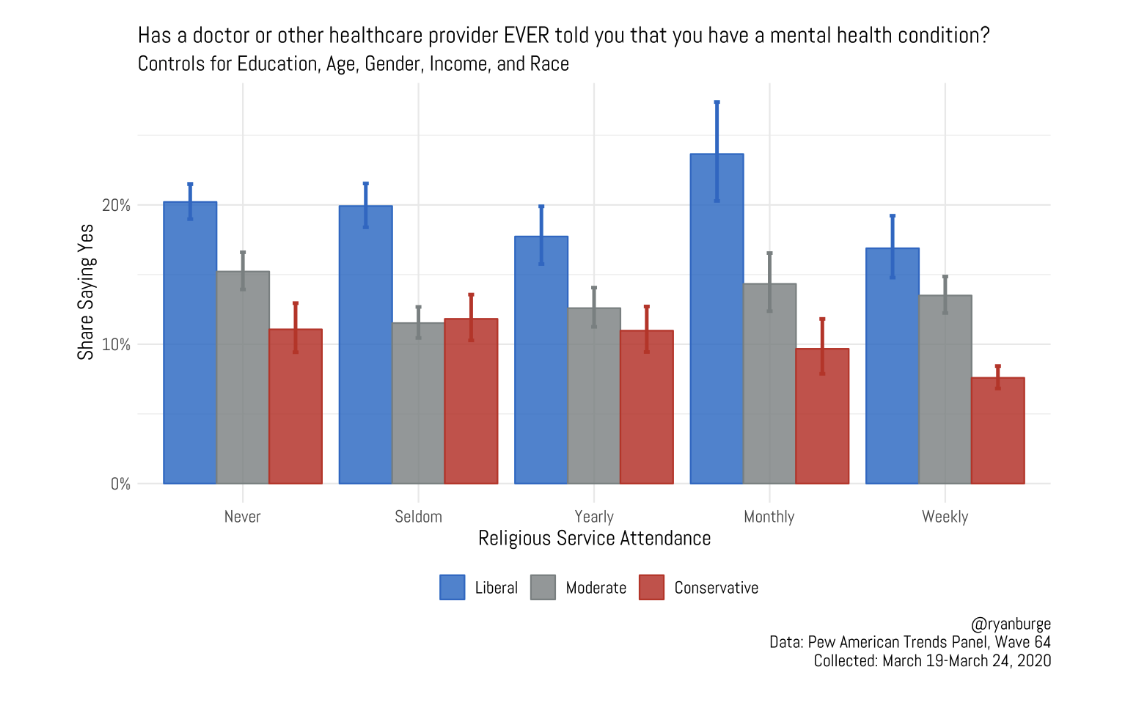It’s bizarre to even type these words, but the COVID-19 pandemic began almost five years ago in the United States. Lockdowns were instituted in March of 2020.
That’s such a weird time capsule for lots of us. I know that we all could write a book about the emotions we experienced and how that period of social isolation impacted our lives.
But, I’m a social scientist, and for all the death and destruction that COVID-19 brought to the United States and every other country on Earth, it also gave us a tremendous window into how folks handled mental stress in near real time.
In fact, the Pew Research Center put a poll into the field in late March of 2020. That was less than a week after many states began to shut down schools and businesses as a mitigation strategy for the spread of COVID-19. They made the data publicly available for download.
I was reading Jonathan Haidt’s Substack over the break, specifically this post: “Why the Mental Health of Liberal Girls Sank First and Fastest.” He highlights a specific question, “Has a doctor or healthcare provider EVER told you that you have a mental health condition?” His post is mostly about topics like gender, age and partisanship.
However, the Pew poll also asks about religion — so let’s get to digging.
I broke the sample down into liberals, moderates and conservatives and then again by larger religious tradition. Here’s the share who said that they had been diagnosed with a mental health condition.
I am just going to lead with what is clearly coming through from this graph — liberals are more likely to being diagnosed with a mental illness compared to conservatives.
A liberal Protestant is nine points more likely than a conservative one. It’s a 10-point gap between liberal and conservative Catholics. There aren’t really any examples of a liberal person being less likely to be diagnosed than a conservative, regardless of religious tradition.
Which religious traditions have higher levels of mental illness?
It’s pretty clear that there’s no real gaps between Protestants and Catholics. However, among the non-religious there is a much greater likelihood of a diagnosed mental illness. For instance, about 30% of liberal atheists have been diagnosed — that’s 10 points higher than liberal Christians.
Let’s look at this another way — political ideology and worship attendance.
Again, that same pattern emerges: liberals are more likely to report a diagnosed mental illness compared to conservatives at the same level of religious attendance. Among never attenders, 28% of liberals have been diagnosed with an illness. It’s just 15% of conservatives who never attend.
The other thing that jumps out is that as religious attendance goes up, the likelihood of mental illness goes down. That’s true for both liberals and conservatives. A person who attends religious services more than once per week is half as likely to report a mental illness compared to one who never attends. That’s true regardless of political ideology.
But, life is complicated. There are a myriad of factors that go into being diagnosed as mentally ill. Folks with higher incomes are more likely to have access to mental health professionals. Same is likely true with education. So, I wanted to test that with a regression. I threw in some basic controls and did the same analysis — religious attendance and political ideology. Guess what?
Yeah, almost nothing changes from the prior graph.
Liberals are more likely to report a mental health condition compared to conservatives. But, for conservatives there is clearly a negative relationship between being diagnosed with a mental illness and religious attendance. Said another way — conservatives who go to church a lot are the least likely to say that they have ever been told by a medical professional that they have a mental illness.
But, I know what some of you are thinking. This asks about being DIAGNOSED with a mental illness. Not if someone actually has a mental illness. There is absolutely evidence that conservatives are less likely to seek out mental health services. So maybe what we are seeing here is not that conservatives are less likely to be mentally ill, it’s that they are just less likely to see a counselor for their problems.
I can kind of test that. Here’s how, using an idea inspired by Lyman Stone.
CONTINUE READING: “Political Ideology, Religious Attendance and Mental Illness” by Ryan Burge at his Graphs About Religion newsletter with Substack.
FIRST IMAGE: Uncredited graphic with this post — “3 Signs of Having a Generalized Anxiety Disorder” — at the Unitas Healthcare Systems website.



